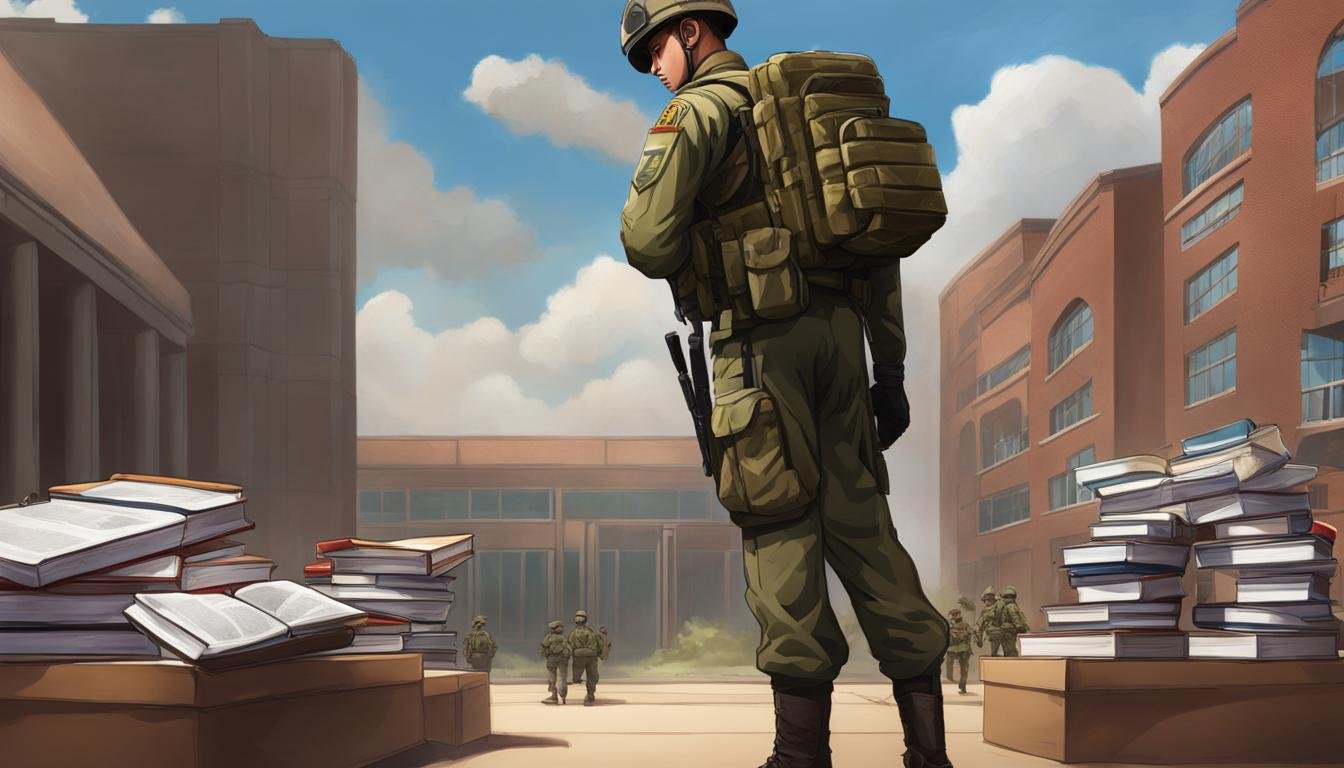Are you an active-duty servicemember looking to pursue higher education while managing your military commitments? Navigating the college admissions process can be challenging, but with the right strategies and guidance, you can achieve your educational goals without compromising your military service. In this article, we will explore some tips and strategies for balancing college admissions and ongoing military commitments.
Key Takeaways:
- Thousands of servicemembers enroll in college during their military careers to boost professional goals and personal development.
- Military-friendly colleges provide options for courses and degrees that fit the needs and ambitions of military students.
- Active-duty servicemembers are eligible for Military Tuition Assistance, which can cover up to $4,500 per year for tuition and other school expenses.
- GI Bill benefits are also available for veterans attending college.
- Finding military-friendly colleges and balancing responsibilities is crucial for managing military obligations and college admissions.
Finding Military-Friendly Colleges and Balancing Responsibilities

When it comes to furthering your education while serving in the military, finding a college that understands and supports your unique needs is crucial. Luckily, there are many military-friendly colleges that offer flexible options for military personnel, making it easier to balance your responsibilities and pursue your educational goals.
One such college is National University, which provides a range of options designed specifically for military students. Whether you prefer face-to-face classes on base or the flexibility of online learning, National University has you covered. They offer a variety of programs that can be completed entirely online, allowing you to study at your own pace and fit your coursework around your military obligations.
Active-duty military students, especially those with irregular schedules or those who are deployed, can greatly benefit from the flexibility of online learning. It allows you to access course materials and complete assignments from anywhere, at any time. This is particularly important for those who may be stationed in remote locations or frequently deployed, as it ensures that you can continue your education no matter where you are.
When choosing a military-friendly college, it’s essential to consider the support services they offer. Look for colleges that have dedicated advisors specifically for military students, as they can provide guidance and assistance throughout your academic journey. These advisors can help you navigate the college admissions process, select appropriate courses, and address any concerns or challenges you may face along the way.
Table: Military-Friendly Colleges Comparison
| College | Online Learning | Face-to-Face Classes on Base | Flexible Transfer Options |
|---|---|---|---|
| National University | Yes | Yes | Yes |
| University of Maryland Global Campus | Yes | Yes | Yes |
| Arizona State University | Yes | No | Yes |
| Excelsior College | Yes | No | Yes |
The table above provides a comparison of some top military-friendly colleges. It’s important to explore your options and find a college that aligns with your needs, preferences, and long-term goals. Remember, your education is an investment in your future, and finding the right college can set you up for success both during and after your military career.
How Can I Balance My Ongoing Military Commitments with College Admissions?
Balancing ongoing military commitments with college admissions can be challenging, but many colleges value and respect applicants’ military service. Highlighting your experience and skills gained in the military can actually be a unique advantage in the college admissions process, as colleges’ view on military service is often highly positive.
How Can I Balance Military Commitments with College Admissions?
Balancing military commitments with college admissions can be challenging, but highlighting military service in college applications can be a valuable asset. Emphasize leadership, teamwork, and dedication gained through military experience. Seek out colleges with strong support for veterans and flexible enrollment options to help manage both responsibilities effectively.
Overcoming Challenges and Advancing Careers
Being an active-duty or veteran military student comes with its fair share of challenges. Balancing school with parenting, career, and military responsibilities can be overwhelming. Additionally, transitioning from military-style learning to a university environment and adjusting to a different college culture can be daunting. You may also face potential mental health challenges along the way. However, despite these obstacles, pursuing a college education while in the military or as a veteran offers numerous benefits.
One of the key advantages of attending college while serving or after leaving the military is the opportunity to expand your career options. A college degree can open doors to new and exciting career paths, allowing you to explore fields that align with your interests and aspirations. It can also increase your job marketability and salary potential, giving you a competitive edge in the civilian workforce.
Moreover, going to college as a military student provides you with the chance to develop new skills that are highly valued in civilian life. The knowledge and expertise gained through higher education can greatly enhance your ability to succeed in various professional settings. Not only does this benefit your career, but it also improves the overall quality of life for you and your loved ones.
Fortunately, military-friendly colleges understand the unique challenges faced by military students and offer resources and support systems to help you overcome them. From flexible class schedules to dedicated advisors, these institutions are committed to ensuring your success throughout your educational journey. Additionally, the Common Application has introduced a new transfer application specifically designed to streamline the college admissions process for active military and veterans, making the transition smoother and more efficient.



